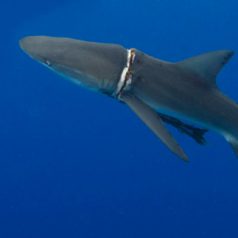
Caribbean relay during the Boskalis Beach Cleanup Tour in collaboration with Save Our Sharks on August 13th – Join us!
It is estimated that more than 5 trillion (that is a 5 with 12 zeros) pieces of plastic float around in the world’s oceans. This has disastrous consequences for marine life and marine ecosystems. Worldwide, coasts are flooded with plastic waste. Many marine animals get stuck in plastic bags and packaging or mistake plastic for foods, which usually has deadly effects. Recently, shark conservation organization Save Our Sharks published an article on their website explaining the often-disturbing figures and consequences of plastic pollution.
Because of the issues associated with plastic pollution, Save Our Sharks decided to join the Boskalis Beach Cleanup Tour, an initiative of the North Sea Foundation where businesses, consumers, civil society, and government clean the entire Dutch coast. On Sunday, August 13th, the Save Our Sharks team and partners will help clean the beach from Castricum to Wijk aan Zee with a group of over 100 volunteers. But we should not forget the beaches in the Dutch Caribbean, which are part of our Kingdom too. A healthy ocean is of vital importance there, as these islands rely on the ocean for tourism and fishing. This is why, at the end of the day we will pass the baton to the nature organizations of Sint Maarten, Curacao, and Aruba, who will then clean up a part of their shores. Everyone who wants to join is welcome. In cooperation with WWF Netherland, the nature organizations of Bonaire, St. Eustatius, and Saba will host cleanups on August 11th. This is the first time cleanups are done throughout the kingdom!
More plastic than fish
It is estimated that all pieces of plastic that are floating in the oceans today weigh a stunning 250,000 tons. The plastic comes into the water as a result of littering on beaches or along rivers. In addition, many household products, such as toothpaste and scrubs, contain microbeads (tiny plastic particles) that get flushed through the drain. Plastic is not biologically degradable, so the amount grows at a shocking speed. A recent report states that in 2050, the oceans will contain more plastic than fish.
It is to be expected that this affects all life in the oceans. We have all see the pictures of dead birds with their stomachs filled with indigestible plastics. But turtles, whales, sea lions, and sharks also mistake plastic bags or other plastic products for food. Scientific research from 2015 shows that 48% of fish tested had plastic in their stomach. This type of research has barely been applied to sharks, but a first study in South Africa yielded the estimate that 7% of sharks have plastics in their stomachs and it is likely that this will be many times higher in other areas. All the more reason to join the Beach Cleanup.
Join!
The cleanup on August 13th starts at 10 PM at Strand paviljoen Deining in Castricum and ends around 4 PM at the SunSeaBar in Wijk aan Zee where we invite everyone to have a cocktail with us. Through a live connection, we will hand over the virtual baton to the Dutch Caribbean. Afterward, a bus will return participants to the starting point in Castricum. You can sign up by clicking the link at the bottom of the article on the Save Our Sharks website. Here you can also find the sources used for this release and some additional information.





